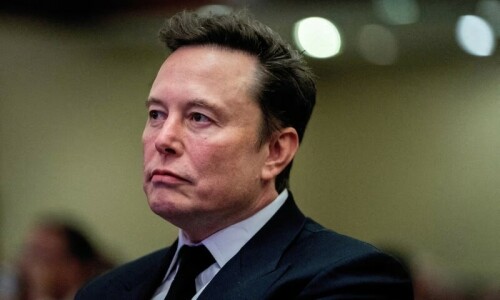PARIS: Five years after it was set up France’s official Muslim council has hit a wall: hamstrung by infighting and accused of failing the country’s Muslims while giving fundamentalists a stronghold in public life.
President Nicolas Sarkozy created the French Council for the Muslim Religion (CFCM) when he was interior minister to give an official voice to the country’s second largest faith.
Charged with hands-on duties organising Haj, appointing prison chaplains it was also intended to discourage what Sarkozy called the “Islam of basements and garages”, sever French Islam from foreign influences and keep tabs on Islamic fundamentalists by including them.
But five years on, its track record is “zero”, says Olivier Roy, a French specialist on Islam.
“It’s just not working,” he said. “On the training of imams, nothing; on appointing chaplains, nothing; on contributing to public debates, nothing.”
“We’ve failed in our mission,” admits Chems-eddine Hafiz, lawyer for the Great Mosque of Paris and a CFCM board member. “Our work has been crippled by conflict and rivalries between different camps.”
Experts point the finger at interference by France’s former colonies in north Africa, the original homeland of the overwhelming majority of French Muslims, that prevents the different communities from working together.
“This is a conflict between Morocco and Algeria for the control of France’s Muslims,” Roy said.
In the latest run-in, the historic Paris mosque which was set up in 1926 with Algerian help announced it was pulling out of the council’s national elections next month.
Its rector Dalil Boubakeur, who has served two terms as president of the CFCM, said the boycott was in protest at “unfair” rules in the vote, which involves some 1,500 mosques and prayer rooms nationwide.
By allocating voting rights in relation to the size of mosques, the Paris mosque argues the system favours new out-of-town prayer rooms many of which are Moroccan-linked at the expense of its own network of small historic city centre mosques.
Tensions between Algerians, the larger community with an estimated 3.5 million people in France, and Moroccans, numbered at one million, have hobbled the project from the start.
But according to Abdelwahab Meddeb, a Tunisian-born poet and Islamic scholar, the council’s troubles also reflect the wider battle gripping the Muslim world, “between traditional Islam, official or state brands of Islam, and Islam as a militant ideology ie Islamism”.
He believes the Paris mosque though it will not say it outright fears losing ground to the radical Union of Islamic Organisations in France (UOIF), the third major force in the CFCM with 10 of the board’s 43 seats.
Over 100,000 people are expected this week near Paris for the annual congress of the UOIF, considered part of the global Muslim Brotherhood movement which seeks to introduce elements of Islamic law by political means.
“The fact the UOIF is so present in the council gives it a very powerful and dangerous means of applying pressure,” Meddeb argues. “It gave them an extraordinary amplifier.” Hafiz admits that “of course” the growing influence of radical Islam is a problem for the Paris mosque, which promotes a traditional, republican view of Islam, in sync with secular French values.
“But there are some issues on which you need to be diplomatic,” he said.
For Meddeb, “the Paris mosque doesn’t know where it stands, just like the whole of traditional Islam. They are petrified, they don’t dare confront Islamism.” Intelligence reports suggest only a few dozen French mosques are under the influence of hardline radicals, but Meddeb says it is a “fact” that many more mosques are warming to the UOIF’s tougher brand of Islam.—AFP














































Dear visitor, the comments section is undergoing an overhaul and will return soon.